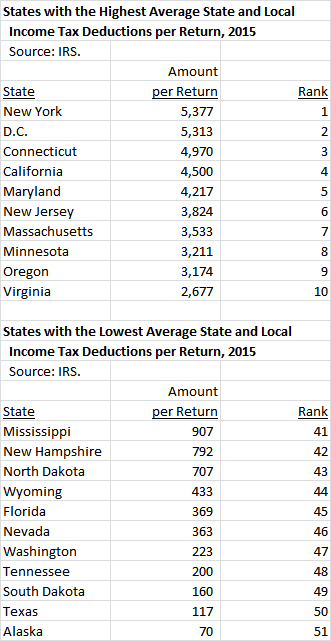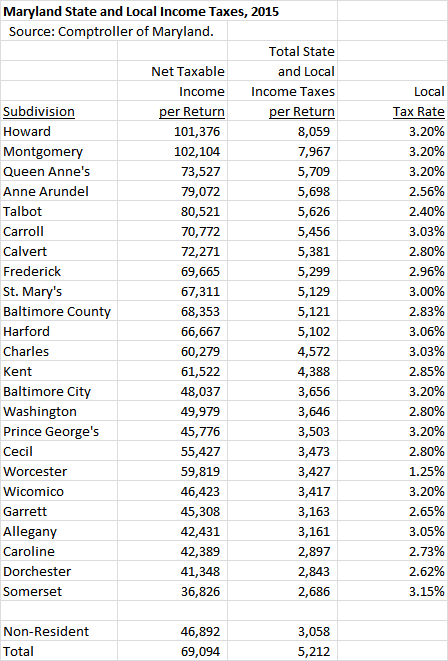By Adam Pagnucco.
Much has been written about the tax bills passed by the U.S. House and Senate in recent weeks. Overall, both bills offer small tax cuts to the poor, modest ones to the middle class and large cuts to the wealthy and corporations. But in order to partially offset the massive tax cuts going to those at the top, the bills do something else.
They discriminate against taxpayers in Maryland.
Why do they do that? One key feature of both bills is that they abolish the ability of individuals to deduct state and local income taxes from their federal incomes. (Property tax deductions would still be allowed up to $10,000.) According to IRS data for Tax Year 2015, U.S. federal taxpayers deducted a total of $334 billion of state and local income taxes from their incomes, more than the amounts they deducted for mortgage interest ($278 billion), charitable contributions ($222 billion), real estate taxes ($187 billion) and state and local sales taxes ($17 billion). Abolishing the state and local income tax deduction hits people who itemize their deductions and pay significant amounts of state and local income taxes. Marylanders are targeted on both those measures.
Itemizing Deductions
According to the above IRS data, 46% of Marylanders itemized their deductions on their federal tax returns in 2015. That’s the highest rate in the country, far surpassing the national rate of 30% and red states like Arkansas (22%), Mississippi (23%), Louisiana (23%), Texas (24%), Alabama (26%), South Carolina (27%) and Georgia (33%).
State and Local Income Tax Deductions
In terms of state and local income tax deductions per return (including non-itemized returns), Marylanders ranked fifth in the nation at $4,217 per return. Maryland trailed New York, D.C., Connecticut and California. Virginia ranked tenth, indicating that the abolition of this deduction will hit the Washington, D.C. metro area particularly hard. The states least impacted are mostly red states and those with little or no income taxes.
Inside Maryland, the impact will be felt differently across the state. That’s because residents of some jurisdictions pay much more in state and local income taxes than others. According to 2015 income tax data from the Comptroller, MoCo and Howard County residents pay by far the most state and local income taxes in Maryland. Residents of many parts of Western Maryland and the Eastern Shore pay the least.
Consider this. If you itemize your deductions, are paying $5,000 in state and local income taxes – roughly the average in Maryland – and your effective federal income tax rate is 15%, you will owe $750 more to Uncle Sam because of the abolition of the state and local income tax deduction.
Does that mean you will owe more federal taxes overall? That depends. If you are wealthy, you could get huge offsetting cuts because of changes to the top income tax brackets and tax cuts on pass-through income from your businesses. If you are poor or middle class, you could benefit from an increase in the standard deduction and an increase in the child credit, but that could be offset by an elimination of the personal exemption. An analysis of the Senate bill two weeks ago by the Institute on Taxation and Economic Policy found almost all of the tax benefits from that bill going to the top quintile of Maryland taxpayers. Changes prior to the Senate floor vote and in conference committee may tweak the details but not the overall impact. And it could get worse: wealthy Republican donors are already complaining that their tax cuts are not big enough.
There are many evils in the GOP’s tax bills: redistribution to the one percent, big tax breaks for multi-nationals who ship jobs overseas, losses of insurance coverage under the Affordable Care Act and more. But for Marylanders, the additional slap in the face is that the bills shift the federal tax burden away from states like Texas, South Dakota, Alaska and Mississippi and onto residents of the Free State. All Marylanders, including Republicans, should oppose that.


